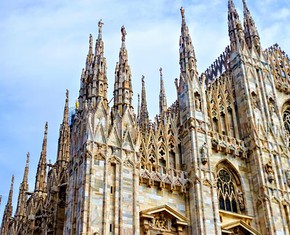The views expressed in our content reflect individual perspectives and do not represent the authoritative views of the Baha'i Faith.
I grew up a Christian, and then I became a Baha’i.
So when I met Mary the other day, and learned she had started to walk that same path, I wanted to share some of my own experiences and thoughts with her. I didn’t get much of an opportunity — we only talked for fifteen minutes or so. She told me that she really loved the spiritual feeling she gets when she says Baha’i prayers and reads the Baha’i writings — but I also learned that she has some trepidation about leaving the familiar religious culture she grew up in. She worries about how her family might react. “I have an enormous amount of anxiety about this,” she said.
Her anxiety might diminish, I suspect, when she understands the difference between a Christian and a Baha’i. Abdu’l-Baha, the son of the prophet and founder of the Baha’i Faith, Baha’u’llah, said:
“The difference between a Christian and a Baha’i, therefore, is this: There was a former springtime, and there is a springtime now. No other difference exists because the foundations are the same. Whoever acts completely in accordance with the teachings of Christ is a Baha’i. The purpose is the essential meaning of Christian, not the mere word. The purpose is the sun itself and not the dawning points. For though the sun is one sun, its dawning points are many. We must not adore the dawning points but worship the sun. We must adore the reality of religion and not blindly cling to the appellation Christianity. The Sun of Reality must be worshiped and followed. We must seek the fragrance of the rose from whatever bush it is blooming–whether oriental or western. Be seekers of light, no matter from which lantern it shines forth. Be not lovers of the lantern.”
RELATED: Who is Christ to Baha’is?
Being a Christian, after all, doesn’t mean belonging to a particular church or wearing a cross or just professing a belief or claiming to be “born again” — it means following Christ. Simply, a Christian tries to emulate the life and the teachings of Christ: love, kindness, mercy, altruism, selflessness, humility, peace. Those central Christian teachings come directly from Christ’s shining virtues and attributes. From a Baha’i perspective, those teachings, at their core, all represent one unified spiritual truth:
“If Christians of all denominations and divisions should investigate reality, the foundations of Christ will unite them. No enmity or hatred will remain, for they will all be under the one guidance of reality itself. Likewise, in the wider field if all the existing religious systems will turn away from ancestral imitations and investigate reality, seeking the real meanings of the Holy Books, they will unite and agree upon the same foundation, reality itself.”
This fundamental, core principle of the Baha’i Faith — the essential unity and harmony of religion — can set us free from the old divisions and prejudices. Humanity no longer needs to separate itself into opposing camps determined by which prophet they follow. What harm could this bring? In a world so filled with disorder and disunity, it could only bring us more acceptance, more love and more peace. Abdu’l-Baha wrote:
“If we investigate the religions to discover the principles underlying their foundations we will find they agree, for the fundamental reality of them is one and not multiple. By this means the religionists of the world will reach their point of unity and reconciliation. They will ascertain the truth that the purpose of religion is the acquisition of praiseworthy virtues, betterment of morals, spiritual development of mankind, the real life and divine bestowals. All the prophets have been the promoters of these principles; none of them has been the promoter of corruption, vice or evil. They have summoned mankind to all good. They have united people in the love of God, invited them to the religions of the unity of mankind and exhorted them to amity and agreement. For example, we mention Abraham and Moses. By this mention we do not mean the limitation implied in the mere names but intend the virtues which these names embody. When we say “Abraham” we mean thereby a Manifestation of divine guidance, a center of human virtues, a source of heavenly bestowals to mankind, a dawning-point of divine inspiration and perfections. These perfections and graces are not limited to names and boundaries. When we find these virtues, qualities and attributes in any personality, we recognize the same reality shining from within and bow in acknowledgment of the Abrahamic perfections. Similarly we acknowledge and adore the beauty of Moses. Some souls were lovers of the name Abraham, loving the lantern instead of the light and when they saw this same light shining from another lantern they were so attached to the former lantern that they did not recognize its later appearance and illumination. Therefore those who were attached and held tenaciously to the name Abraham were deprived when the Abrahamic virtues reappeared in Moses. Similarly the Jews were believers in His Holiness Moses, awaiting the coming of the Messiah. The virtues and perfections of Moses became apparent in His Holiness Jesus Christ most effulgently but the Jews held to the name Moses, not adoring the virtues and perfections manifest in him. Had they been adoring these virtues and seeking these perfections they would assuredly have believed in His Holiness Jesus Christ when the same virtues and perfections shone in him. If we are lovers of the light we adore it in whatever lamp it may become manifest but if we love the lamp itself and the light is transferred to another lamp we will neither accept nor sanction it. Therefore we must follow and adore the virtues revealed in the messengers of God whether in Abraham, Moses, Jesus or other prophets but we must not adhere to and adore the lamp.”
This Baha’i teaching of religious evolution parallels the scientific discoveries related to how living organisms evolve. Just as each living thing evolves in a system, so does religion — which must continue to grow, develop and emerge from its former structures into adaptive new ones.
RELATED: Was Jesus God?
So if you’re investigating the Baha’i Faith, and you’re worried about leaving behind past beliefs, you can set those worries aside. When you become a Baha’i, you don’t abandon your former Faith — you fulfill its prophetic promise.
You May Also Like
Comments

















As to Christ’s uniqueness: The Bible testifies to the progressive revelation of religion—a foundational Baha'i principle. Christ makes it clear He is the Prophet like Moses promised in Deut. 18:15 & says "another Advocate" will come after Him. He speaks with the Pharisees about marriage, teaching that God’s Anointed teach according to our changing capacity.
What Christ & Baha'u'llah teach is ...in accord & there’s no reason to reconcile it with doctrine we invented.
Genesis teaches in the first few paragraphs, that God created light when he said “Let there be light.”
God is uncreated.
Light is created.
Light is an *example* of God’s goodness, but is not God Himself.
Worshipping light, or truth, rather than the very source of light and truth is missing the point.
The real question is:
Do Baha’i believe Jesus Christ died on the cross and rose again three days later, paying the penalty for the sins of the world?
It's not specific Baha'i laws that are eternal, but the spiritual principles of God's Faith, which is changeless. It is our perception that changes along ...with the social teachings required in each age.
However, according to Jesus, we cannot "emulate" His life or teachings--it is only by abiding that HE produces such fruit. An apple tree does not "try" to produce apples, it simply produces apples as its roots remain connected to the life-source. I do ...not need another "religion" to sit at the feet of my precious Lord and savior. Honoring Jesus is to keep my eyes on Him alone, not a new label.
Just as Jesus was not literally Moses, but a Prophet like Moses promised to us by God (Deut. 18:15), Baha'u'llah is the same Divine Spirit with a new name. When I kept my eyes on Christ, He led me to Baha'u'llah.
Christ repeatedly teaches how God wants us to behave. Primacy goes to a teaching that we love God with our entire being and our ...neighbor as ourself. Christ says "Do this, and you shall live" (Luke 10). Pressed further, He tells a Parable(the Good Samaritan) concluding: "Go and DO likewise." These instructions answer a key question: "What must I do to inherit eternal life?"
" And the Day of the Lord will come as a Thief in the Night;; in which the heavens shall pass away with a great noise and the elements shall melt with fervent heat, the earth also and the works that are therein shall be burnt up".
II Peter ...iii, 10